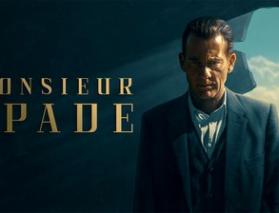Review of Sleepy Hollow, Episode 4
Sleepy Hollow continues to be both entertaining AND educational. This week, we learn that Boston Tea Party was actually a diversion planned by Ichabod Crane so that he could sneak aboard a British ship and steal one of their secret weapons: a grimoire known as the Lesser Key of Solomon. (Presumably not the one published by the charlatan Alisteir Crowley in the early 20th century.) This foul tome possesses the power to open a portal to some sort of hell dimension and release certain demons to roam upon the earth and wreak havoc thereon. This portal opening happens to be a pet project of one Moloch, the nasty head demon who’s has been orchestrating the entire apocalypse affair up until now from the in-between world. Back in 1773, Crane managed to capture the book from its Hessian guardians and smuggle it safely to General Washington. Unfortunately, Moloch has since dispatched his modern minions—the descendants of these Hessians, still loyal to the cause and awaiting the right time to act—to retrieve it from its hiding place and commence with the portal opening. Once again, Crane has to stop the evil book from falling into the wrong hands, this time with the help of Abbie Mills and her recently-escaped-from-the-mental-asylum sister(who, as it happens, knows much more about what’s going on that anyone else still living). Where is the book hidden? In a Dutch Reformed church, complete with holy water font and statue of the Virgin Mary. Because if there’s one thing Calvinists love, it’s Mariolatry.
With so many things to choose from here, I think it might be most interesting to say a word or two about conspiracy theories. This particular show is rife with them, as are many bestselling works of popular fiction (and “non“-fiction), which is a reflection of the fascination that our culture has with the idea that something sinister is going on in the shadows and just around the corner out of sight. The standard American narrative runs something like this: Americans are good people who keep trying to do the right thing in society—pass good laws, treat each other right, build a just community, or whatever. And yet our noble efforts to achieve these goals are thwarted at every turn by cryptic and evil forces beyond our control. Therefore, there must be some sort of conspiracy at work trying to keep us down or hold us back from the good things we want for ourselves and for others. The fact that we can’t see these evil forces simply proves that they are really there and really out to get us.
This makes excellent fiction. I freaking LOVE the idea that there’s a secret conspiracy out there somewhere driven by demons, Germans, and German-speaking demons, and that the only line of defense against this conspiracy is made up of a plucked-out-of-his-time-Oxford-professor/American-rebel, a policewoman who just wanted to get out of town, and her insane sister. This is great storytelling in the tradition of Evil Dead 2 and They Live.
The problem begins when we carry this fiction over into the real world, which sadly happens all too often. In one sense, Christians should never be conspiracy theorists. I don’t mean you can’t be suspicious that the government is up to something shady. That certainly happens, though even here I would, as a political scientist, encourage a good deal of caution. After all, on the rare occasion when something is up, we usually find out about it in the end. But most of the time, nothing is up at all. The government is currently struggling to keep its own doors open; I don’t think we have to worry about Big Brother orchestrating a complex scheme to take away all our freedoms quite yet…
Yet, in another sense Christians should understand that conspiracies are not necessary to explain the awfulness of the world. That we always fail to do good is not the result of a mysterious shadow assassin just waiting to plunge his deadly dagger of devilry into the heart of our unicorn-pure society. In fact, we are the problem. The world does not work right—in the realm of politics, culture, or whatever—not because there are forces “out there” trying to stop it, but because it is full of wicked people. We are sinners by nature and carry around within ourselves everything necessary to destroy whatever we touch.
And this is the problem with the true-blue conspiracy theorist: he is usually willing to blame everyone but himself. It is infinitely easier to blame the problems of the world on Hessians waiting in the shadows than it is for us to confront our own sin and see how destructive and wicked it is.
So hopefully we can see the delicate line to be walked here by the thoughtful and careful Christian. Is the government (or the Illuminati, or the Hessians, or whoever) up to something shady? Maybe, maybe not. In either case, we do not get to outsource all evil to them. As Christians it is our responsibility to punch holes in the standard American conspiracy narrative by declaring the solid Biblical truth that we are not good people doing good things in the first place. And then of course it’s our further responsibility to hold up the Cross as the source of forgiveness offered by a gracious God. And that is no secret or conspiracy; it is the public and open triumph of God over all our sin through the substitutionary atonement of Christ. Where the narrative would have us checking corners and looking in the shadows, Christianity offers a public display held out for all the world to see.
One other thing about Sleepy Hollow: Ichabod Crane continues to be awesome. ‘Nuff said.
Dr. Coyle Neal is a full-time Assistant Professor of Political Science at Southwest Baptist University, but only a part-time tinfoil hat wearer.













